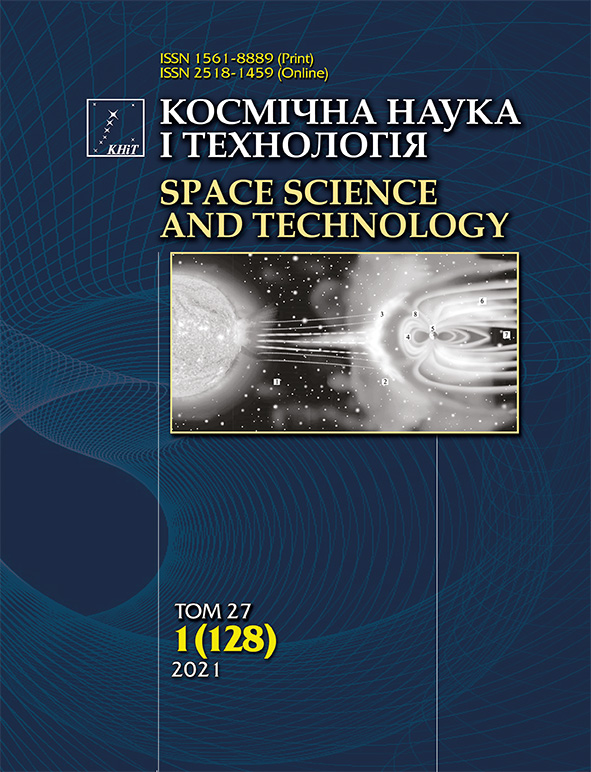Прогнозування локальних геомагнітних збурень на прикладі даних магнітної обсерваторії «Львів»
DOI:
https://doi.org/10.15407/knit2021.01.078Ключові слова:
космічна погода, локальна геомагнітна активність, регресійне моделюванняАнотація
Вперше в світовій практиці отримано моделі для прогнозування геомагнітних елементів X, Y, Z. В даній роботі наводяться результати такого прогнозування для магнітної обсерваторії «Львів» з глибиною прогнозу 3 години. Розроблені моделі мають такі властивості: обсерваторія — LVV; прогнозовані величини — XYZ; глибина прогнозу — 3 год; коефіцієнти кореляції з усередненими даними вимірювань — 0.24 (X), 0.811(Y), 0.804 (Z); ефективність прогнозування — 0.816 (X), 0.803 (Y), 0.801 (Z); skill score — 0.115 (X), 0.095 (Y), 0.099 (Z). Розроблені моделі пройшли апробацію у Головному центрі спеціального контролю і були визнаними такими, що задовольняють основні вимоги до оперативних прогнозних моделей.
Посилання
Forecast verification methods. URL: http://www.cawcr.gov.au/projects/verification/ (Last accessed: 09.09.2019).
International Real-time Magnetic Observatory Network (INTERMAGNET). URL http://www.intermagnet.org (Last accessed: 09.09.2019).
OMNIWeb online database. URL: https://omniweb.gsfc.nasa.gov/html/ow_data.html (Last accessed: 09.09.2019).
World Data Center for Geomagnetism, Kyoto. URL: http://wdc.kugi.kyoto-u.ac.jp/ (Last accessed: 09.09.2019).
Fisher R. А. (1954). Statistical methods for research workers. London: Oliver and Boyd.
Hudson D. (1964). Statistics lectures on elementary statistics and probability. Geneva.
Billings S. A. (2013). Nonlinear system identification. Wiley.
King J. H., Papitashvili N. E. (2004). Solar Wind Spatial Scales in Comparisons of Hourly Wind and ACE Plasma and Magnetic Field Data. J. Geophys. Res., 110, A02209
https://doi.org/10.1029/2004JA010804.
Machol J. L., Reinard A. A., Viereck R. A., Biesecker D. A. (2013). Identification and replacement of proton-contaminated real-time ACE solar wind measurements. Space Weather, 11, № 7, 434—440.
https://doi.org/10.1002/swe.20070.
Parnowski A. S. (2009). Regression modeling method of space weather prediction. Astrophys. and Space Sci., 323, № 2, 169—180.
https://doi.org/10.1007/s10509-009-0060-4 [arXiv:0906.3271].
Parnowski A. S. (2011). Regression modelling of geomagnetic activity. J. Phys. Studies, 15, № 2, 2002.
https://doi.org/10.30970/jps.15.2002
Parnowski A. S., Polonska A. Yu. (2012). Regression modelling of the interaction between the solar wind and the terrestrial magnetosphere. J. Phys. Studies, 16, № 1/2, 1002.
https://doi.org/10.30970/jps.16.1002
Press W. H., Teukolsky S. A., Vetterling W. T., Flannery B. P. (1992). Numerical Recipes in FORTRAN. The Art of Scientific Computing. 2nd Ed. Cambridge: Cambridge Univ. Press.
Reay S., Herzog D., Alex S., Kharin E., McLean S., Nosé M., et al. (2011). Magnetic Observatory Data and Metadata: Types and Availability. Geomagnetic Observations and Model, 149—181.
https://doi.org/10.1007/978-90-481-9858-0_7
Semeniv O., Polonska A., Parnowski A. (2014). Operational geomagnetic forecast service. Bull. Taras Shevchenko Nat. Univ. Kyiv. Ser. Astronomy, № 51, 23—24.
Sumaruk T, Sumaruk Yu. (2007). The New Index of Geomagnetic Activity. Publications of the Institute of Geophysics Polish Academy of Sciences. Monographic volume C-99(398), 374—382.


